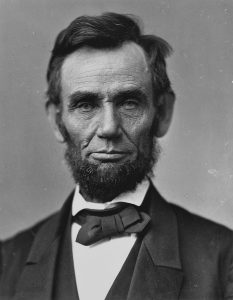It is hardly a news flash to say that Abraham Lincoln was our greatest President. But what do we mean by "greatness"? It's a term that historians, who spend much of their time debunking reputations, are reluctant to use, because it lacks precision. But let's begin by acknowledging that Lincoln, like Churchill in the following century, (1) changed the course of history by saving a beleaguered democracy; (2) that in the dire circumstances in which he found himself in 1861, only he could have done this (again, like Churchill in 1940); and (3) that his extraordinary character as a leader depended not simply on excellence in one sphere of activity but in multiple roles, including the ability to articulate unforgettably the meaning of the struggle in which he and his people were engaged. Here, too, in his mastery of all the resources of the English language, Churchill resembled him. But there was a difference: Churchill was an aristocrat, born in a palace; Lincoln, as everybody knows, was born in a log cabin and almost entirely self-taught. As Christopher Hitchens remarked in an essay about Lincoln, the other great American presidents—Washington, the Adamses, Jefferson, Madison, the two Roosevelts—were all members of the existing governing class. Lincoln alone came from "the very bone and marrow of the country." Every individual is, of course, unique, and something of a mystery, even to himself. His contemporaries testified to an aura of mystery about Lincoln: "he was the most reticent, secretive man I ever saw—or expect to see" (Judge David Davis). "He never opened his whole soul to any man: he never touched the history or quality of his own nature in the presence of friends" (William Herndon). He left no diary or memoirs, and never sustained an intimate correspondence for very long with one person. "During neither his frequent attacks of melancholy nor his moments of gaiety, when he became a delightful companion, did he expose the secret recesses of his mind." (Don Fehrenbacher). Also remember that it was not only his remarkable character that enabled him to achieve greatness, it was also his intellect. He was almost entirely self-educated, but he must have been one of the most intelligent men ever to occupy the White House. Jefferson may be his only rival in this respect. But Jefferson had the best education the eighteenth century could offer, while Lincoln had barely two years of schooling. Yet Lincoln, as we shall see, read omnivorously, taught himself the principles of rhetoric and argument, became a distinguished lawyer without ever having gone to law school, made an intensive study of Euclidean geometry to develop his powers of logical analysis, meditated deeply on philosophical and theological issues, and, starting from scratch, read his way into the vast literature of military strategy in order to fulfill his responsibilities as Commander in Chief. And as everyone knows, he became the greatest writer among American presidents, surpassing even the author of the Declaration of Independence, the document that was the key to his own political thought.
Bruce Thompson
RECOMMENDED READING
Destined to become a classic in American history and biography, David Herbert Donald’s Lincoln is a masterly account of how one man’s extraordinary political acumen steered the Union to victory in the Civil War, and of how his soaring rhetoric gave meaning to that agonizing struggle for nationhood and equality. This fully rounded biography of America’s sixteenth President is the product of Donald’s half-century of study of Lincoln and his times. In preparing it, Donald has drawn more extensively than any previous writer on Lincoln’s personal papers and those of his contemporaries, and he has taken full advantage of the voluminous newly discovered records of Lincoln’s legal practice. He presents his findings with the same literary skill and psychological understanding exhibited in his previous biographies, which have received two Pulitzer Prizes. Donald brilliantly traces Lincoln’s rise from humble origins in Kentucky to prominent positions in legal and political circles in Illinois, and then to the pinnacle of the presidency. He shows how, in all these roles, Lincoln repeatedly demonstrated his enormous capacity for growth, which enabled one of the least experienced and most poorly prepared men ever elected to high office to become a giant in the annals of American politics. Much more than a political biography, Donald’s Lincoln reveals the development of the future President’s character and shows how his private life helped to shape his public career.
RECOMMENDED READING
"Immediately takes its place as the best one-volume history of the coming of the American Civil War and the war itself. It is a superb narrative history, elegantly written."--Philadelphia Inquirer
"Matchless....The book's political and economic discussions are as engrossing as the descriptions of military campaigns and personalities."--Library Journal
"McPherson cements his reputation as one of the finest Civil War historians....Should become a standard general history of the Civil War period--it's one that will stand up for years to come."--Kirkus Reviews
"The best one-volume treatment of [the Civil War era] I have ever come across. It may actually be the best ever published....I was swept away, feeling as if I had never heard the saga before....Omitting nothing important, whether military, political, or economic, he yet manages to make everything he touches drive the narrative forward. This is historical writing of the highest order."--Hugh Brogan, New York Times Book Review
RECOMMENDED READING

Doris Kearns Goodwin,
Team of Rivals: The Political Genius of Abraham Lincoln,
Simon & Schuster (September 26, 2006),
ISBN 978-0743270755


